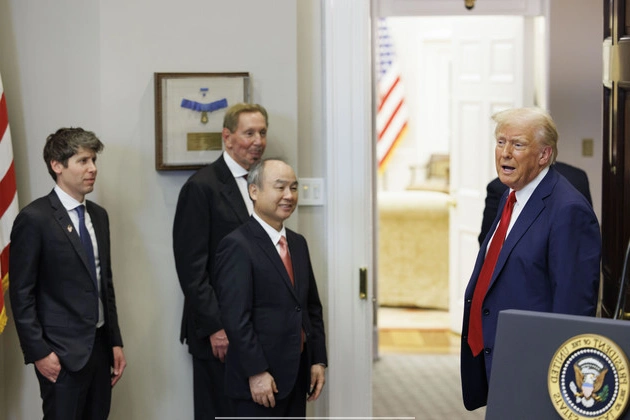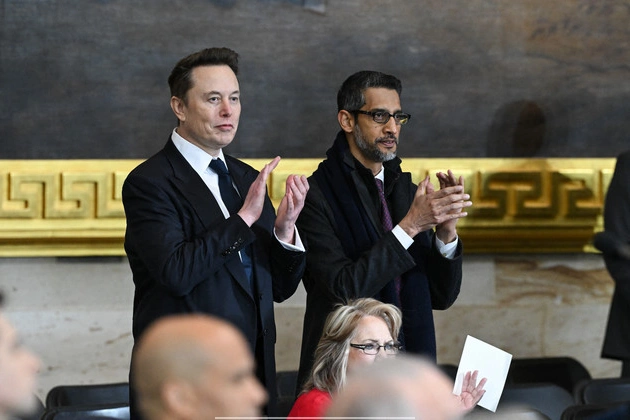
Unlocking the Potential of Artificial Superintelligence: The Trump AI Plan Fallout
The Rise and Fall of Trump’s AI Plan
At the White House on Tuesday, SoftBank CEO Masayoshi Son confidently predicted that “artificial superintelligence” will kick off America’s “golden age.” President Donald Trump beamed as Son, OpenAI’s Sam Altman and Oracle’s Larry Ellison announced a $500 billion investment in an American scheme to unlock the potential of super-powerful AI.
The Fallout and Clash of Titans
The goodwill didn’t last 24 hours. Elon Musk, the close Trump adviser who has his own AI company and was notably not at the press conference, erupted Wednesday with a relentless stream of online mockery. “They don’t actually have the money,” he posted on X.
He directed particular vitriol at Altman, whose OpenAI he co-founded and is currently suing; he reposted an image of a crack pipe with the joking allegation that Altman and his associates were smoking it. After hours of this, Altman finally slapped back, saying “i realize what is great for the country isn’t always what’s optimal for your companies, but in your new role i hope you’ll mostly put 🇺🇸 first.”
Stargate Project: A Political Victory Lap Turned Rivalry
Politically, it’s part of Trump’s promise to build out American tech capacity and lock in geopolitical dominance over China. The group was there to promote a new collaboration between SoftBank, OpenAI, Oracle and MGX to build up to $500 billion in AI data centers over the next four years. Dubbed “Stargate,” it’s supposed to massively scale up existing operations to speed the development of godlike AI systems that Ellison promised would develop instant, bespoke cancer vaccines.
The Quest for Artificial General Intelligence
Now, really, what they’re jostling for is bragging rights over the biggest and most impressive artificial minds being built — systems that claim to approach “artificial general intelligence,” the ambiguously defined, hypothetical AI system that can match or surpass human capabilities.
Expert Insights on the Stargate Project
For a more in-depth look at what they’re fighting over, and why it matters so much, DFD called Ethan Mollick, a University of Pennsylvania Wharton School professor and author of “Co-Intelligence: Living and Working With AI.”
Mollick sounded a different note of skepticism about the project on X, wondering what all this competition is speeding us toward. “For those convinced they are making AGI soon,” he asked, “what does daily life look like 5-10 years later?” He spoke to DFD about what, exactly, each party thinks they’re getting into with this massive investment, and what it means for America’s relationship to the AI industry.
Concerns and Questions About AGI
Part of this is we’ve got this weird R&D investment into a somewhat ill-defined, but if it happens, absolutely society-changing, economy-changing thing. So you want a piece of this next world. People are putting money in on that. But it is hard to imagine checking every box, especially because there’s no policy piece to go with it. The money investment is one piece, but what is the geopolitical element? It’ll be a U.S. company scaling faster. It’s a little bit of everything, and people are getting what they want, but it’s not clear that it’s a solution to every problem. There are questions about open models rather than closed models, is the government putting its finger on a scale for one versus another? It’s a little confusing. The Biden AI executive order got rescinded and not replaced by anything, and we’re not yet in a place where there’s any national direction.
The Future of AGI and Global Competition
Increasingly, the way the AI companies have been announcing things, they view this as an intermediate step to ASI, a super-intelligent machine, a sort of machine god. I don’t know what their vision for the future is with this product. Everyone has different views, but thinks they’re ushering in a new era and wants to be there for it. People in these labs are very sincere, and there has been a vibe shift that AGI is achievable.
Comparing Stargate to Past Endeavors
It’s hard to know, because in some ways it’s not really a research project. Those programs were comparable at least in size, if 500 billion of funding actually happens. But those projects were, at peak, 0.5 percent of U.S. GDP. Meta spent more money last year on H100 chips than was spent inflation-adjusted on the Manhattan Project. So already it’s like comparing the size of Delaware to a banana. We shouldn’t confuse the yardstick of mass amounts of money with the scale of intent.
Elon Musk’s Skepticism and Scaling War
Well yes, there’s bad blood between him and OpenAI. But also I think he is winning the scaling war right now. Informally, from what I hear from people, he’s managed to get more chips online faster than anyone else. Grok models are scaling very quickly. He’s very critical of OpenAI because he wants to win the race, but again, no one’s articulated what the end point of the race looks like, so I don’t know what winning means for them.
The Vision and Unknowns of AGI
They’re always willing to say it comes down to supercharged scientific research, which may very well be true, but also requires rethinking how science is organized to take advantage of these models. What does that look like? There are a lot of other social components that have to fit into it.










